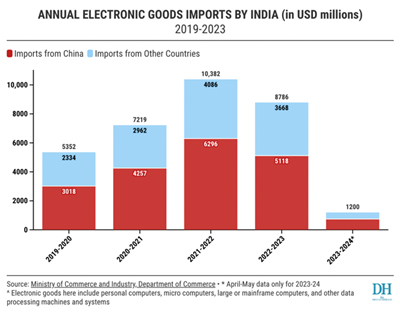Centre Rolls Back its Plan to Licence Laptop, PC Imports
20-10-2023
11:53 AM
1 min read

What’s in Today’s Article?
- Why in News?
- Background
- Government’s Plans of Introducing “Import Management System”
- National Security Directive on Telecommunication Sector
- Reasons Behind the Introduction of Import Management System
- News Summary

Why in News?
- The Union Government has rolled out an ‘Import Management System’ for IT hardware, including laptops and computers, modifying its initial stance of imposing physical restrictions.
- The notification comes just days after concerns were raised by US, China, South Korea and Taiwan at a recent World Trade Organisation meeting.
Background
- On 3rd August 2023, the Union Government imposed restrictions on import of laptops, tablets, all-in-one personal computers and ultra-small computers and servers with immediate effect.
- However, this decision was later suspended till 1st November, 2023.
- The Directorate General of Foreign Trade (DGFT) had to suspend the implementation as custom officials stationed at ports started holding up shipments of the specified electronic items.
- The issue had also come up in meetings between US and Indian officials after American companies including Apple, Dell, and HP urged the US government to ask Indian government to reconsider its policy.
Government’s Plans of Introducing “Import Management System”
- The Union government is conducting consultations on a new system through which it aims to monitor the sources from which IT hardware is being imported.
- Through a system known as “Import Management System”, the government will monitor the sources from which IT hardware is being imported.
- After the introduction of this system, finished IT hardware such as laptops, personal computers and servers can only be imported from “trusted geographies”.
- Beyond laptops, personal computers and servers, the directive could be applied on a large range of finished IT hardware equipment including 5G sensors, which are predominantly being imported from China.
- The Import Management System is currently in draft stage. Once finalised, it is expected to replace the licensing requirement.
- There is precedence to this idea of allowing imports only from trusted sources.
National Security Directive on Telecommunication Sector
- In June 2021, the Central government launched the ‘trusted telecom portal’ and signaled the implementation of the National Security Directive on Telecommunication Sector (NSDTS).
- Under the directive, telecom companies are mandatorily required to connect in their networks only those new devices which are designated as “trusted products” from “trusted sources”.
- Post the 5G spectrum auction last year, operators like Reliance Jio and Bharti Airtel have signed agreements with companies like Ericsson and Samsung, excluding Chinese majors Huawei and ZTE.
Reasons Behind the Introduction of Import Management System
- China Factor –
- Data released by the Ministry of Commerce and Industry gives us a broad picture of India’s dependence on China with regard to the import of electronic goods such as laptops, computers etc.
- Indeed, India’s imports of the aforementioned class of electronic goods have been steadily rising.
- Whereas in 2019-20, India’s imports of electronic goods stood at $5.3 billion, that figure climbed to $10.3 billion in 2021-22, before declining slightly to hit $8.7 billion in 2022-23.
- Given this fact, a rise in indigenous manufacturing would not only help India reduce its dependence on its diplomatic and business rival but would also help indigenous manufacturers expand their footprint globally.
- The introduction of Import Management System could force IT hardware companies to establish new supply chains, as China is unlikely to be classified as a trusted geography.
- Security Factor –
- Another factor behind the restrictions imposed on this class of electronic goods is concerns about ‘security’.
- The restrictions may have been brought in to guard against electronic hardware coming in with “in-built security loopholes that may potentially endanger sensitive personal and enterprise data”.
- Across the world, many red flags have been raised about cybersecurity with regard to Chinese-manufactured electronics.
News Summary
- The Union Government has rolled out an ‘Import Management System’ for IT hardware, including laptops and computers, modifying its initial stance of imposing physical restrictions.
- Under the proposed IMS, IT hardware companies will be required to register and disclose data related to their imports, and countries from which they import, among other things.
- Laptops, personal computers (including tablet computers), microcomputers, large or mainframe computers, and certain data processing machines have been covered under the new imports monitoring system.
- The system will ensure that it will be faceless and contactless, and there will be no hassles for importers to fill in their details
- This comes as a big relief to the industry which feared that the previous licensing notification would lead to a kind of quota system.
- There will be no restrictions on imports under baggage rules, and import of one laptop, tablet, personal computer or ultra-small form factor computer, including those purchased from e-commerce portals through post or courier, will also be exempted.
- Exemption has also been provided for up to 20 such items per consignment for the purpose of R&D, testing, benchmarking, evaluation and product development.
- Government officials maintained that the changes have been made to make it an “end-to-end” online system to monitor imports and ensure such items come from trusted sources
Q1) What is meant by Custom Duty?
Customs duty refers to the tax imposed on goods when they are transported across international borders. In simple terms, it is the tax that is levied on import and export of goods. The government uses this duty to raise its revenues, safeguard domestic industries, and regulate movement of goods.
Q2) What is meant by Anti Dumping Duty?
Anti-dumping duties are taxes imposed on imported goods in order to compensate for the difference between their export price and their normal value, if dumping causes injury to producers of competing products in the importing country.
Source: Centre rolls back its plan to licence laptop, PC imports | FE


